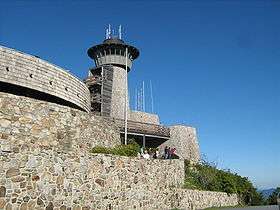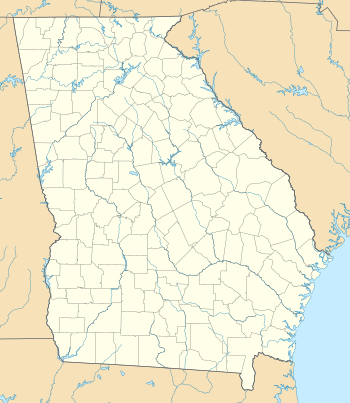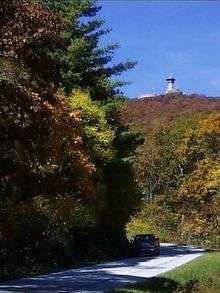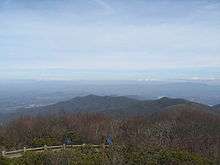Brasstown Bald
| Brasstown Bald | |
|---|---|
| Enotah | |
 Observation tower atop Brasstown Bald | |
| Highest point | |
| Elevation | 4,784 ft (1,458 m) [1] |
| Prominence | 2,108 ft (643 m) [1] |
| Listing | U.S. state high point 25th |
| Coordinates | 34°52′27″N 83°48′38″W / 34.874199°N 83.810652°WCoordinates: 34°52′27″N 83°48′38″W / 34.874199°N 83.810652°W [2] |
| Geography | |
 Brasstown Bald Towns / Union counties, Georgia, United States | |
| Parent range | Blue Ridge Mountains |
| Topo map | USGS Jacks Gap |
| Climbing | |
| Easiest route | Drive or hike |
Brasstown Bald is the highest point in the state of Georgia. Located in northeast Georgia, the mountain is known to the native Cherokee people as Enotah.[2] The name in English is derived from a mistaken translation of the term for a former Cherokee village nearby, located along the upper Brasstown Creek (named in English from the same error) feeding the Hiawassee River.
Across the North Carolina state line, immediately north of the mountain, are other places named in that error of English settlers: Brasstown, a community in the Brasstown township of Clay County, North Carolina.
Brasstown Bald is partly in both Towns and Union counties, the peak being divided by the county line. The mountain is part of the Blue Ridge Mountains (part of the Appalachian Mountains), and within the borders of the Blue Ridge Ranger District of the Chattahoochee National Forest. The mountain consists mostly of soapstone and dunite.
On a clear day, it is possible to see the tall buildings of Atlanta from the summit. The U.S. Forest Service has webcams atop the observation tower, and a RAWS weather station further down the mountain. The public can drive to the top via Georgia State Route 180 Spur.
History
According to the two Georgia historical markers, the area surrounding Brasstown Bald was settled by the Cherokee people. English-speaking settlers derived the word "Brasstown" from a translation error of the Cherokee word for its village place. Settlers confused the word Itse'yĭ" (meaning "New Green Place" or "Place of Fresh Green"), which the Cherokee used for their village, with Ûňtsaiyĭ ("brass"), and referred to the settlement as Brasstown. Itse'yĭ is a Cherokee locative name given to several distinct areas in the Cherokee region, including an area nearby over the current state line of North Carolina.
Cherokee legend tells that a great flood swept over the land. All the people died except a few Cherokee families who sought refuge in a giant canoe. The canoe ran aground at the summit of a forested mountain (now known as Enotah). As there was no wild game for the people to hunt and no place for them to plant crops, the Great Spirit killed all the trees on the top of the mountain so that the surviving people could plant crops. They continued planting and lived from their crops until the water subsided.
Other spellings of names given to Brasstown Bald by the Cherokee: Echia, Echoee, Etchowee and Enotah.
The term "Bald" is common terminology in the southern Appalachians describing mountaintops that have 360-degree unobstructed views.
T.S. Candler Memorial
Former Georgia Supreme Court Judge T.S. Candler is memorialized with a stone monument at Brasstown Bald; it was erected in 1971 three months before he died in recognition of his efforts to support visitors to the mountain.
T.S. Candler was born to William Ezekiel Candler and Mary Haralson on December 15, 1890, in nearby Blairsville, Georgia. Candler was a graduate from Young Harris College in 1913 and later attended the University of Georgia Law School, where he received his degree in 1915. After graduating, Candler returned to Blairsville. He began to practice law and became a prominent public figure in the community. He supported creating a visitors center at Brasstown Bald for the public.
In 1953, T.S. Candler was appointed as a Georgia Supreme Court judge, where he served until he retired in 1966. Judge Candler died on September 15, 1971.
Distances to summit
From the northeast, starting at the intersection of Owl Creek Road and the concurrent Georgia 17 and Georgia 75 near Mountain Scene, the climb is 13.5 kilometers (8.4 mi) long, gaining 828 meters (2,717 ft).
From the southeast, starting at the intersection of Georgia 180 and Georgia 17/75 near Sooky Gap, the climb is 13.1 kilometers (8.1 mi) long, gaining 790 meters (2,592 ft), an average of 6.0% grade.
From the west, starting at the intersection of Georgia 180 and Georgia 348 near Choestoe, the climb is 14.9 kilometers (9.3 mi), gaining 856 meters (2,808 ft), an average of 5.7% grade.
From the intersection of Route 180 and Route 180 Spur at Jacks Gap the climb is 4.9 kilometers (3.0 mi) at an average gradient of 11.2%, (height gain: 551 meters (1,808 ft)).
An additional route to the summit is the Wagon Train Trail, starting at Young Harris College. The trail is traditionally hiked by graduating students and their families on the evening before graduation; a vespers service is held at the summit.
Tour de Georgia
In the 2005 through 2008 editions of the Tour de Georgia, a long-distance bicycle race, Brasstown Bald was the site of an hors categorie "King of the Mountains stage" finish.
| Year | Stage | Start | Winner |
|---|---|---|---|
| 2008 | 6 | Blairsville | Kanstantsin Sivtsov |
| 2007 | 5 | Dalton | Levi Leipheimer |
| 2006 | 5 | Blairsville | Tom Danielson |
| 2005 | 5 | Gainesville | Tom Danielson |
| 2004 | 6 | Athens | Cesar Grajales |
Broadcasting
NOAA Weather Radio station KXI22 transmits from atop the mountain, simulcasting with KXI75 from Blue Ridge, Georgia. The programming originates from NWSFO Peachtree City.
Georgia Public Broadcasting had or has construction permits from the Federal Communications Commission (FCC) for two low-power broadcast translator stations at the summit. The digital TV station on channel 12 (W12DK-D, licensed December 2009) is the direct replacement for analog TV station W04BJ in nearby Young Harris, and also covers for W50AB in nearby Hiawassee (both to the north). New station WBTB FM 90.3 will transmit at just 97 watts, equivalent to several hundred watts because of the height above average terrain of over 700 meters, or more than 2,300 feet. Both stations will have Young Harris as the city of license.
Images
-
Georgia Historical Marker #1
-

Approaching Brasstown Bald
-

Aerial view of Brasstown Bald
-

Picnic area at Brasstown Bald
-

Viewing North Carolina from Brasstown Bald
-

Looking south from Brasstown Bald
-

Brasstown Bald Parking as seen from Summit
-

Road leading up to Brasstown Bald Summit
-

Brasstown Bald Viewing Tower
-

View from Brasstown Bald in February
-

Atlanta and Sawnee Mountain viewed from Brasstown Bald
See also
- Brasstown Wilderness
- Index of Georgia (U.S. state)-related articles
- List of U.S. states by elevation
- List of mountains in Georgia (U.S. state)
- Outline of Georgia (U.S. state)
References
- 1 2 "Brasstown Bald, Georgia". Peakbagger.com. Retrieved 2012-11-08.
- 1 2 "Brasstown Bald". Geographic Names Information System. United States Geological Survey. Retrieved 2012-11-08.